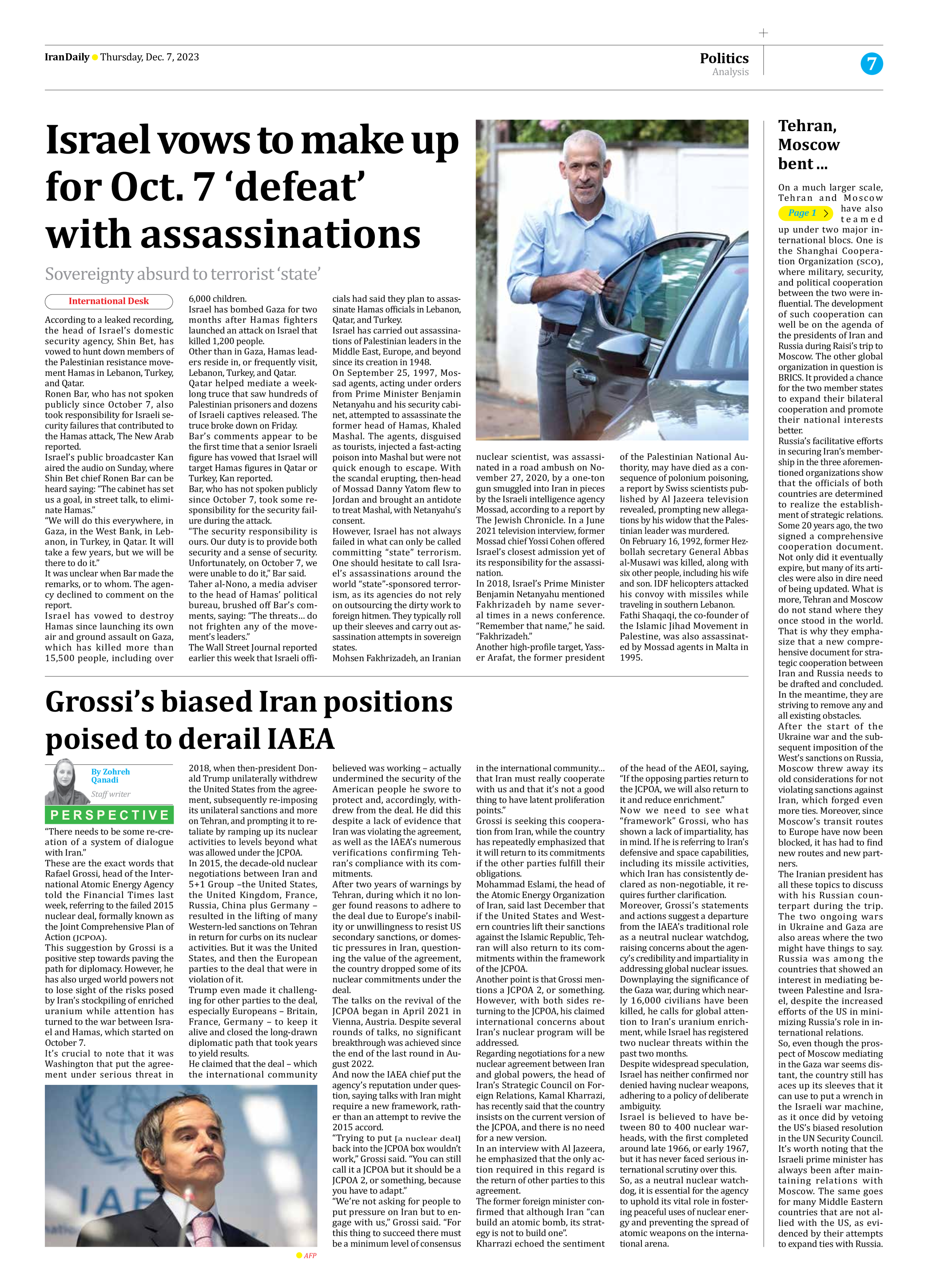
Grossi’s biased Iran positions poised to derail IAEA
By Zohreh Qanadi
Staff writer
“There needs to be some re-creation of a system of dialogue with Iran.”
These are the exact words that Rafael Grossi, head of the International Atomic Energy Agency told the Financial Times last week, referring to the failed 2015 nuclear deal, formally known as the Joint Comprehensive Plan of Action (JCPOA).
This suggestion by Grossi is a positive step towards paving the path for diplomacy. However, he has also urged world powers not to lose sight of the risks posed by Iran’s stockpiling of enriched uranium while attention has turned to the war between Israel and Hamas, which started on October 7.
It’s crucial to note that it was Washington that put the agreement under serious threat in 2018, when then-president Donald Trump unilaterally withdrew the United States from the agreement, subsequently re-imposing its unilateral sanctions and more on Tehran, and prompting it to retaliate by ramping up its nuclear activities to levels beyond what was allowed under the JCPOA.
In 2015, the decade-old nuclear negotiations between Iran and 5+1 Group –the United States, the United Kingdom, France, Russia, China plus Germany – resulted in the lifting of many Western-led sanctions on Tehran in return for curbs on its nuclear activities. But it was the United States, and then the European parties to the deal that were in violation of it.
Trump even made it challenging for other parties to the deal, especially Europeans – Britain, France, Germany – to keep it alive and closed the long-drawn diplomatic path that took years to yield results.
He claimed that the deal – which the international community believed was working – actually undermined the security of the American people he swore to protect and, accordingly, withdrew from the deal. He did this despite a lack of evidence that Iran was violating the agreement, as well as the IAEA’s numerous verifications confirming Tehran’s compliance with its commitments.
After two years of warnings by Tehran, during which it no longer found reasons to adhere to the deal due to Europe’s inability or unwillingness to resist US secondary sanctions, or domestic pressures in Iran, questioning the value of the agreement, the country dropped some of its nuclear commitments under the deal.
The talks on the revival of the JCPOA began in April 2021 in Vienna, Austria. Despite several rounds of talks, no significant breakthrough was achieved since the end of the last round in August 2022.
And now the IAEA chief put the agency’s reputation under question, saying talks with Iran might require a new framework, rather than an attempt to revive the 2015 accord.
“Trying to put [a nuclear deal] back into the JCPOA box wouldn’t work,” Grossi said. “You can still call it a JCPOA but it should be a JCPOA 2, or something, because you have to adapt.”
“We’re not asking for people to put pressure on Iran but to engage with us,” Grossi said. “For this thing to succeed there must be a minimum level of consensus in the international community… that Iran must really cooperate with us and that it’s not a good thing to have latent proliferation points.”
Grossi is seeking this cooperation from Iran, while the country has repeatedly emphasized that it will return to its commitments if the other parties fulfill their obligations.
Mohammad Eslami, the head of the Atomic Energy Organization of Iran, said last December that if the United States and Western countries lift their sanctions against the Islamic Republic, Tehran will also return to its commitments within the framework of the JCPOA.
Another point is that Grossi mentions a JCPOA 2, or something. However, with both sides returning to the JCPOA, his claimed international concerns about Iran’s nuclear program will be addressed.
Regarding negotiations for a new nuclear agreement between Iran and global powers, the head of Iran’s Strategic Council on Foreign Relations, Kamal Kharrazi, has recently said that the country insists on the current version of the JCPOA, and there is no need for a new version.
In an interview with Al Jazeera, he emphasized that the only action required in this regard is the return of other parties to this agreement.
The former foreign minister confirmed that although Iran “can build an atomic bomb, its strategy is not to build one”.
Kharrazi echoed the sentiment of the head of the AEOI, saying, “If the opposing parties return to the JCPOA, we will also return to it and reduce enrichment.”
Now we need to see what “framework” Grossi, who has shown a lack of impartiality, has in mind. If he is referring to Iran’s defensive and space capabilities, including its missile activities, which Iran has consistently declared as non-negotiable, it requires further clarification.
Moreover, Grossi’s statements and actions suggest a departure from the IAEA’s traditional role as a neutral nuclear watchdog, raising concerns about the agency’s credibility and impartiality in addressing global nuclear issues.
Downplaying the significance of the Gaza war, during which nearly 16,000 civilians have been killed, he calls for global attention to Iran’s uranium enrichment, while Israel has registered two nuclear threats within the past two months.
Despite widespread speculation, Israel has neither confirmed nor denied having nuclear weapons, adhering to a policy of deliberate ambiguity.
Israel is believed to have between 80 to 400 nuclear warheads, with the first completed around late 1966, or early 1967, but it has never faced serious international scrutiny over this.
So, as a neutral nuclear watchdog, it is essential for the agency to uphold its vital role in fostering peaceful uses of nuclear energy and preventing the spread of atomic weapons on the international arena.







